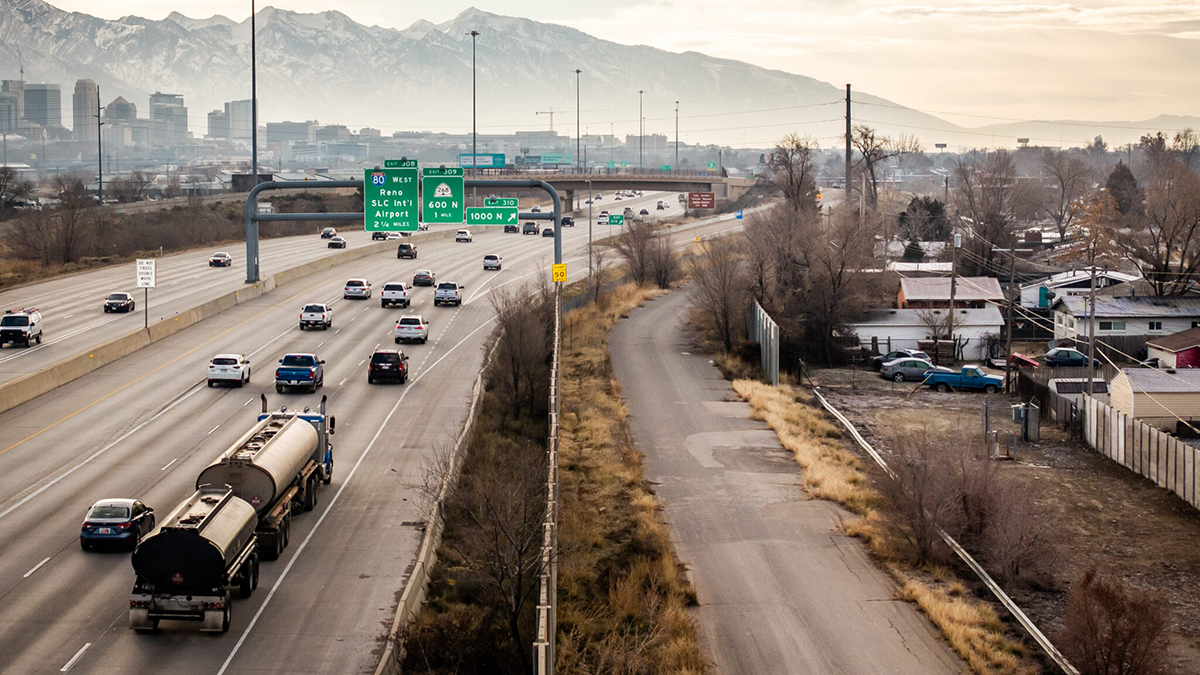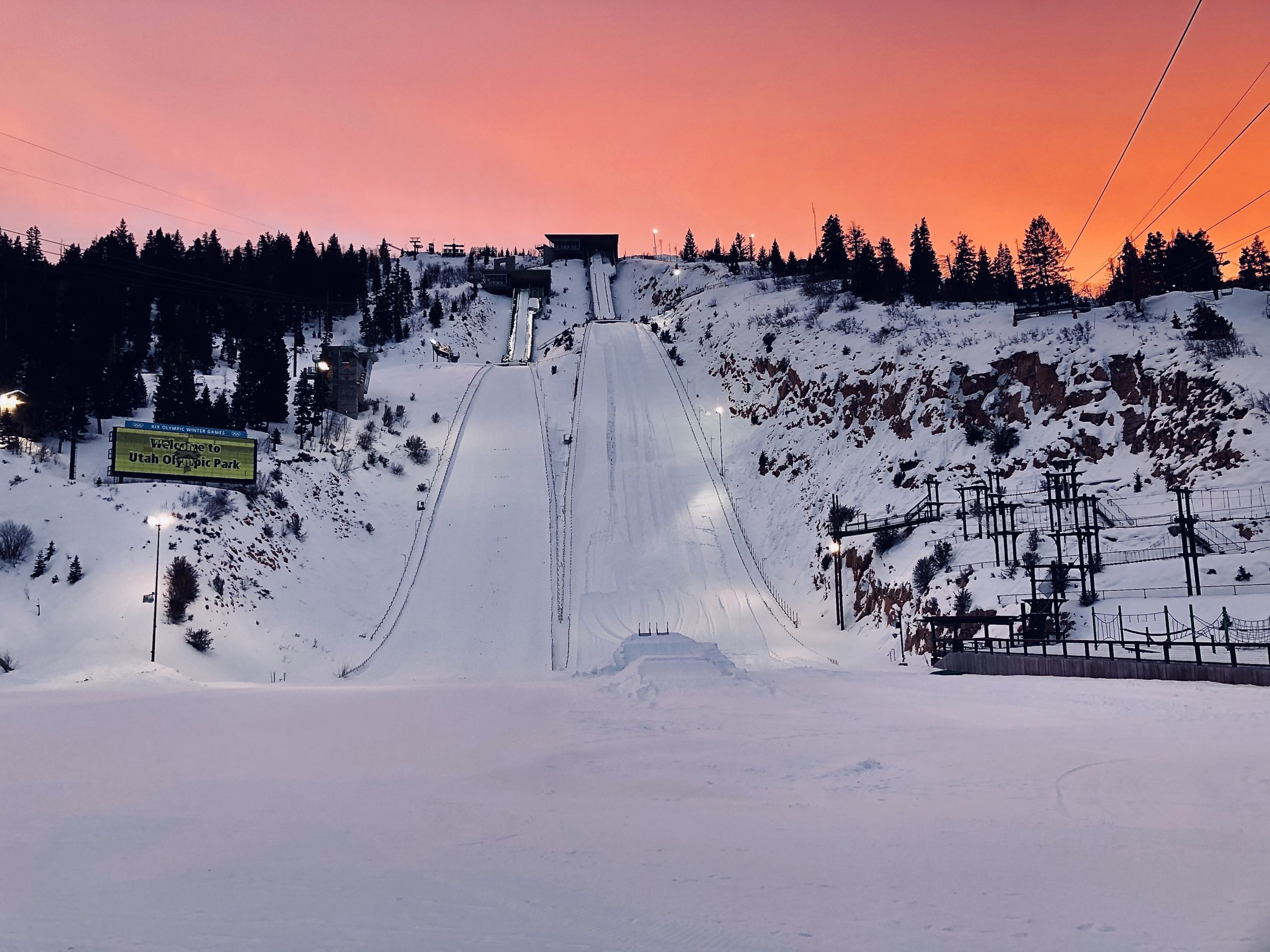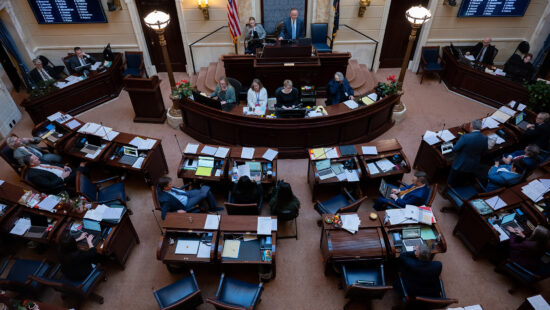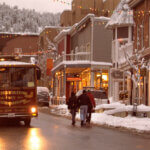Environment
Utah lawmakers quietly repeal teleworking for state employees on bad air days

Traffic moves along I-15 near neighborhoods in the Rose Park neighborhood of Salt Lake City on Wednesday, January 3, 2024. Photo: Spenser Heaps for Utah News Dispatch
Utah’s ‘surge remote work’ program encouraging state employees to work from home on poor air quality days will end in May. State officials determined it didn’t make a difference, so they’re abandoning it.
SALT LAKE CITY, Utah – Since 2021, eligible Utah state employees have worked under a “surge remote work” program Utah lawmakers created that year to require working from home, when possible, on poor air quality days.
But that policy is about to end. A little-known bill that repeals it will take effect May 7.
Utah lawmakers tucked the repeal into HB404, which mainly clarified who can participate in the state’s pay-for-performance management program, meant to incentivize employees to meet performance goals. As it made its way through the legislative process, public discussion in both chambers focused only on the pay-for-performance provisions of the bill. During their presentation of the legislation on the House and Senate floors, HB404’s sponsors never mentioned the repeal, which appeared in innocuous language near the end of the bill
Though four Democrats voted against it in the Senate, the bill easily passed both chambers, with no opposition in the House. Gov. Spencer Cox signed it into law March 26.
Now, state employees are beginning to learn that the program initially pitched as a way for the state to lead out on proactive air quality efforts will cease to exist in less than four weeks, and just in time for the state’s smog-prone summer months.
But state officials say they’re moving away from the surge work program because traffic data shows it’s not making a difference.
Marilee Richins, deputy executive director of the Department of Government Operation, confirmed to Utah News Dispatch on Thursday that eligible state employees will no longer be asked to work from home on bad air days as of May 7.
She said the recommendation to end the program came after traffic data collected by the Utah Department of Transportation showed no statistical impact on the number of cars on the road during red air days.
“It was a great idea,” Richins said of the program when it was first conceived, inspired by the drastic reduction of road congestion and improved air quality during COVID-19 shut downs. But ultimately, she said UDOT’s traffic cameras showed the number of vehicles on the roads on surge days were “not statistically impacted at all.”
“In fact on some surge days, it increased,” she said.
According to two UDOT “surge day analysis” reports — one with an analysis period in July and August of 2023 and the other conducted during the same period in 2024 — the department’s Traffic Management Division determined “daily variation in traffic volumes makes it difficult to determine the actual impact of surge days.”
“The daily traffic volume fluctuation likely accounts for the differences observed in surge and non-surge days,” the report written in January 2025 said. “Any difference in volumes appears to be statistically insignificant.”
Richins noted that the state still has an “active teleworking program” that was established in 2018, separate from surge remote work linked to bad air quality days. Of the state’s roughly 22,000 employees, she said 8,890 have jobs that allow them to telework two to three times a week. That’s the same number of employees that are eligible for surge days.
An additional 3,982 employees telework full time, Richins added, noting that most of these employees live in rural areas off of the Wasatch Front.
In 2022, Utah had more than 2.25 million licensed drivers, according to the Federal Highway Administration, and ranks as the state with the third-highest rate of car ownership in the country, according to Forbes statistics.
Never intended as an ‘employee benefit’
Though some employees are likely disappointed to see the program end, Richins said it was never intended as an “employee benefit.”
“I know that some employees saw that as a benefit, but it was never put in place as an employee benefit,” she said. “It had nothing to do with that. Surge days was about cleaning the air. And surge days have been shown to not have any impact on cleaning the air.”
Though there was no public discussion during the 2025 Utah Legislature about repealing the program specifically as part of HB404, the governor earlier this year did indicate that he was supportive of reevaluating the state’s teleworking policies.
“Remote work has its place, but so does being together,” Cox said during a news conference in January. “It’s not healthy to be isolated. We need that feedback, we need that interaction that comes … and being able to get in a room together and be able to talk and look at each other face to face … that matters.”
Also in January, the Deseret News reported how state leaders — after initially launching a 2018 teleworking pilot program that encouraged telecommuting then fully embracing it after COVID-19 hit — have pulled back on remote work to strike more of a “balance” between remote and in-person work.
The repeal of the surge remote work program is the latest change in that effort. A spokesperson for Cox did not respond to a request for comment Thursday about his signing of HB404.
Don’t ditch the program — strengthen it, senator says
Utah faces unique clean air challenges. The Salt Lake Valley’s bowl-shaped geography can exacerbate pollution issues, especially during winter inversions, which can trap cold air in the valley. Summer months can also bring extra pollutants, especially from wildfire smoke.
At times, the Salt Lake area can rank among the top most polluted cities in the nation, and sometimes the world. Last July, Salt Lake City had the 14th worst air quality globally and the worst for a U.S. city, according to IQ Air.
Motor vehicles — cars and trucks — are the main source of Utah’s air pollution today, causing 55% of winter emissions, according to a 2020 Envision Utah report. Homes and businesses (specifically for heating and wood burning) make up 27% of winter emissions.
Sen Nate Blouin, D-Salt Lake City, was among the four Democrats that voted against HB404, though most of their arguments against were over changes to the state’s pay-for-performance program. He told Utah News Dispatch on Thursday that at least some Senate Democrats were aware of the repeal of the surge work program tucked into the bill, but they did not publicly debate it on the Senate floor in part due to time limitations.
The bill won final legislative approval on the last night of the 2025 session that ended March 7, with just 13 minutes to spare before lawmakers’ midnight deadline.
Blouin argued the repeal in HB404 is pointing Utah “in the wrong direction” when it comes to clean air efforts. He said instead of “ditching” the program after looking at traffic data, state officials should have looked to see how they can improve it.
“Rather than say we’re just not even going to try, let’s make it stronger, let’s try to do something that actually does work,” he said. “And there are many ways we can do that. I’d love to see obviously (more efforts) in the private sector and look for ways to incentivize the majority of our workforce and not just the minority of folks that work for state government.”
Richins, however, said repealing the program was the “responsible thing to do.” She said state officials took a step back and asked, “is it working?”
“It’s not,” she said. “That doesn’t mean we don’t care about clean air. We care a lot about clean air. It means that we want to do things to clean up the air that work.”
But that’s not the only misgiving Blouin had with HB404. He acknowledged it was a little-known bill with repeal language that was easy to miss, and he took issue with putting the end of the surge program in a bill focused on a separate issue. He said that strategy is happening more frequently, leaving Utahns feeling caught off guard by legislation.
“We shouldn’t have these things just tucked inside (bills),” Blouin said. “That’s part of why people don’t have a whole lot of trust in the Legislature or government as a larger entity right now.”
The bill’s sponsor, Rep. Stephanie Gricius, R-Eagle Mountain, did not immediately return a request for comment through a House spokesperson Thursday.
Written by Katie McKellar for Utah News Dispatch


















